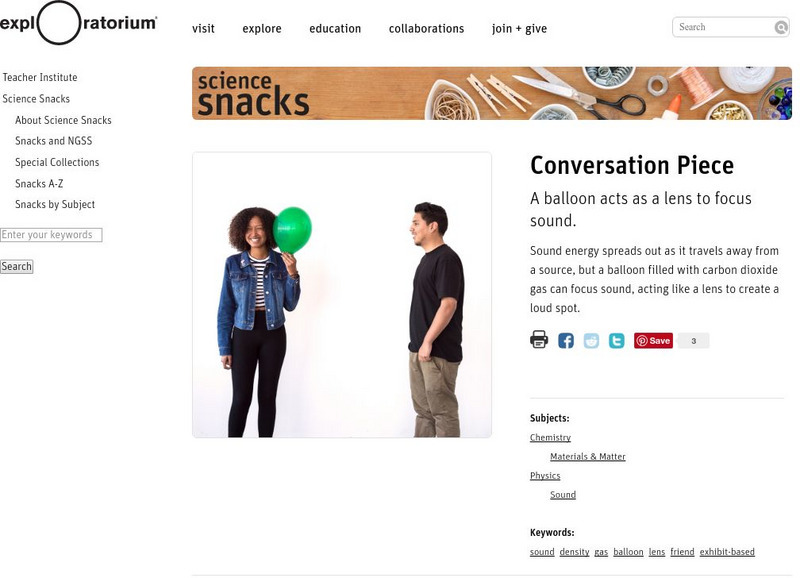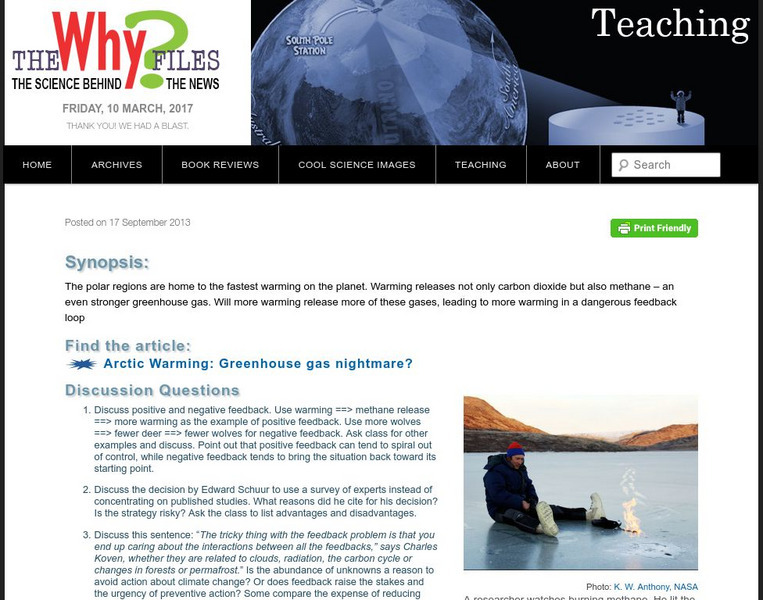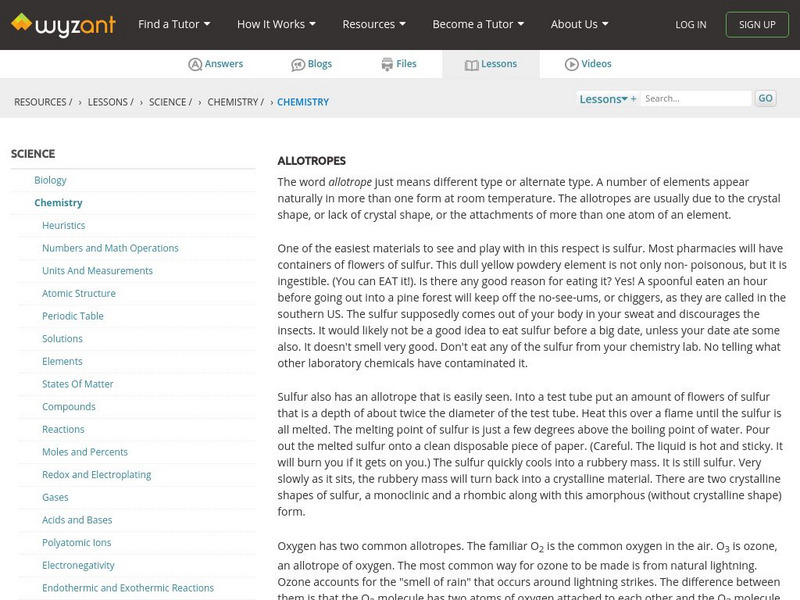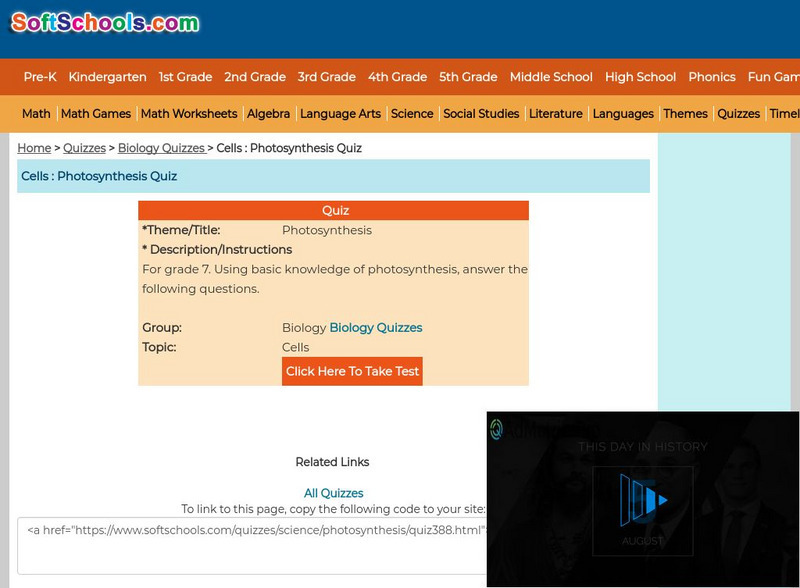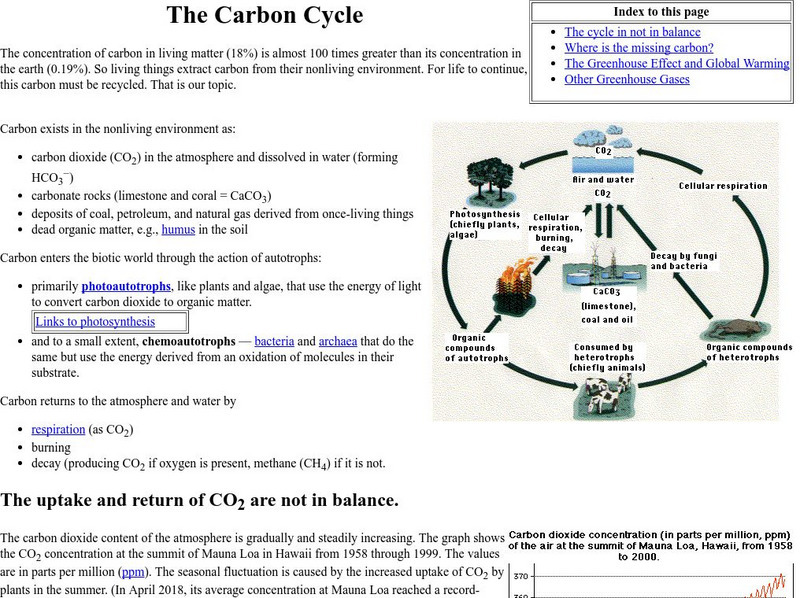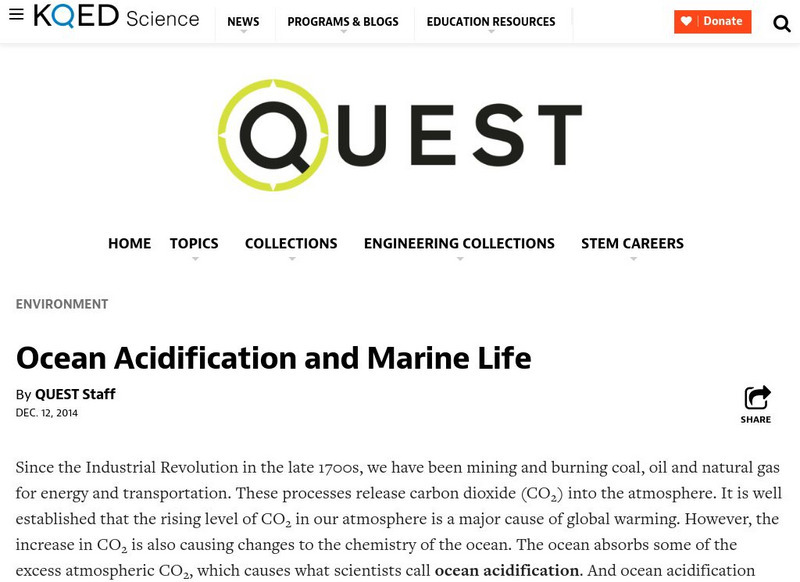Hi, what do you want to do?
Exploratorium
Exploratorium: Science Snacks: Conversation Piece
Did you know a balloon filled with carbon dioxide can act as an amplifier? In this activity test how sound travels through carbon dioxide molecules.
NASA
Nasa: Climate Time Machine
Take a trip in a "time machine" to see a series of pictures that show the how the climate of Earth has been changing. The indicators shown are: sea ice, sea level, carbon dioxide, and global temperature.
NASA
Nasa: Climate Kids: Planet Health Report: Air
Students see the amount of carbon in Earth's atmophere with this graph explained in basic terms.
American Chemical Society
Middle School Chemistry: Co2 Reacting With Water
See how carbon dioxide reacts with water to produce carbonic acid.
NASA
Nasa: Planets in a Bottle
In this simple lesson, students grow yeast to learn how the climates on each of the nine planets would affect life.
CPALMS
Florida State University Cpalms: Florida Students: Knights of the Round and Round Table: The Carbon Cycle
Resource to help learn about the carbon cycle.
University of Wisconsin
The Why Files: Arctic Warming and Greenhouse Gasses
Explore how the warming of the Earth's polar regions may lead to releasing greenhouse gasses.
TeachEngineering
Teach Engineering: Let's Heat Things Up!
Students observe demonstrations, and build and evaluate simple models to understand the greenhouse effect, the role of increased greenhouse gas concentration in global warming, and the implications of global warming theory for engineers,...
Wyzant
Wyzant: Chemistry: Terms
This lesson provides a list of chemical terms, defines them, and uses examples to describe and explain each. These include allotropes, ionic compounds, methane, carbon dioxide, alkali flats, blue vitriol, and others.
Bio Topics
Bio Topics: Photosynthesis
This site details the process of photosynthesis. Photosynthesis is the process of the production of oxygen by plants and carbon dioxide by animals, both of which are needed for respiration purposes.
Read Works
Read Works: Miss Johnson's Plant Experiment
[Free Registration/Login Required] A literary text about a teacher who does an experiment to teach her students that plants need sunlight. A question sheet is available to help students build skills in reading comprehension.
CK-12 Foundation
Ck 12: Plix Series: Henry's Law
[Free Registration/Login Required] Observe what happens to carbon dioxide gas as pressure is increased in this carbonated soda simulation. Afterwards, answer a multiple-choice challenge question.
PBS
Pbs: American Experience: Earth Days: Timeline:the Modern Environmental Movement
Trace the advance of the environmental movement from 1948 through the 1980s. Read about the legislation promoting a healthy environment passed under both Democratic and Republican presidents.
Soft Schools
Soft Schools: Biology Quizzes: The Carbon Cycle
Assess your understanding of the carbon cycle with this interactive multiple choice quiz. Immediate feedback is provided.
Soft Schools
Soft Schools: Biology Quizzes: Photosynthesis
Assess your understanding of photosynthesis with this interactive multiple choice quiz. Immediate feedback is provided.
Biology Pages
Kimball's Biology Pages: The Carbon Cycle
Useful introduction to the carbon cycle with a diagram and a discussion of the effects of carbon dioxide on the greenhouse effect and global warming.
PBS
Quest: How Ocean Acidification Affects Shelled Organisms
This step-by-step tutorial walks students through the effects of ocean acidification on some shelled marine organisms.
Other
Elmhurst College: Virtual Chembook: Carbon Cycle
A step-by-step discussion of the stages in the carbon cycle. Each step includes a diagram further explaining the processes involved, as well as pictures depicting combustion, respiration, photosynthesis, and decomposition.
Chem Tutor
Chem Tutor: Dissolving Gases Into Liquids
Description of the factors influencing gas solubility. This site also provides other chemistry related questions. Topics include dissolving solids into liquids, concentration, and stoichiometry.
Enchanted Learning
Enchanted Learning: Label the Lungs
Do you know the parts of the lung? Check out this lung diagram that can be printed out for students to label the various parts.
American Geosciences Institute
American Geosciences Institute: Earth Science Week: Chemistry of Burning
In this activity, students use pipe cleaners and foam balls to build a model of a hydrocarbon molecule. They then modify it to demonstrate the chemical reaction that happens when the hydrocarbon is burned.
PBS
Nova: The Big Energy Gamble
Students conduct an energy audit to determine how much carbon dioxide their family is producing, and then make recommendations for lowering their family's carbon footprint.
Concord Consortium
Concord Consortium: Stem Resources: Greenhouse Gases
Do you understand the relationship between temperature and carbon dioxide in our atmosphere? This computer model shows factors such as clouds and carbon dioxide that could cause global temperatures to rise. Students investigate how the...
American Geosciences Institute
American Geosciences Institute: Earth Science Week: Your Own Greenhouse
Climate scientists around the world study greenhouse gases and the ways they affect global climate. By making a small greenhouse, recreate the greenhouse effect and measure its effect on temperature.





